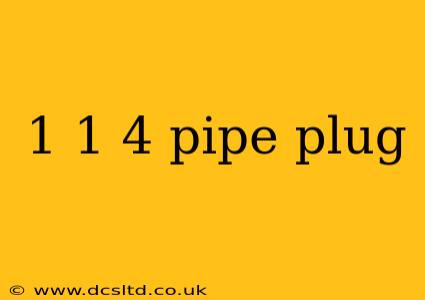Finding the right pipe fitting can feel like navigating a maze, especially when dealing with specifics like a 1 1/4" pipe plug. This guide aims to clarify what a 1 1/4" pipe plug is, its applications, materials, and how to choose the right one for your project. We'll also address common questions surrounding this essential plumbing component.
What is a 1 1/4" Pipe Plug?
A 1 1/4" pipe plug is a threaded fitting used to seal the end of a 1 1/4-inch nominal diameter pipe. "Nominal diameter" refers to the pipe's internal diameter, not its external dimensions. The plug's purpose is simple: to prevent leakage, block flow, or provide a solid, sealed termination point for a pipe. It's a crucial element in various plumbing, hydraulic, and industrial applications.
What are 1 1/4" Pipe Plugs Made Of?
The material of a 1 1/4" pipe plug dictates its durability, corrosion resistance, and suitability for different applications. Common materials include:
- Steel: Offers high strength and durability, ideal for high-pressure applications. Often galvanized for corrosion resistance.
- Brass: Known for its corrosion resistance and excellent machinability. Suitable for less demanding applications.
- Plastic (e.g., PVC, CPVC): Lightweight and cost-effective, suitable for lower-pressure applications and chemical compatibility considerations are important. Not as strong as metal.
- Cast Iron: Durable and heavy, often used in older plumbing systems. Susceptible to rust if not properly coated.
Choosing the right material depends heavily on the fluid being conveyed, the operating pressure, and the overall environment.
What are the Different Types of 1 1/4" Pipe Plugs?
While the basic function remains the same, variations exist:
- Male Plugs: These have external threads that screw into a female threaded pipe fitting.
- Female Plugs (Less Common): These have internal threads, requiring a male threaded pipe to be screwed in. These are less commonly used as pipe ends are usually male threaded.
Where are 1 1/4" Pipe Plugs Used?
1 1/4" pipe plugs find applications in diverse settings, including:
- Plumbing: Sealing unused pipe outlets, preventing leaks, and completing plumbing systems.
- Hydraulic Systems: Sealing off hydraulic lines during maintenance or system modifications.
- Industrial Applications: Used in various industrial processes where sealing is critical.
- Pneumatic Systems: Sealing compressed air lines.
How Do I Choose the Right 1 1/4" Pipe Plug?
Selecting the correct 1 1/4" pipe plug involves considering several factors:
- Pipe Material and Thread Type: Ensure the plug's thread type (e.g., NPT, BSP) matches the pipe's threading.
- Pressure Rating: The plug must have a pressure rating exceeding the system's operating pressure.
- Material Compatibility: The plug material should be compatible with the fluid being handled to prevent corrosion or chemical reactions.
- Size and Dimensions: Accurate measurement is crucial to ensure a proper fit.
What is the difference between a pipe plug and a pipe cap?
While both seal the end of a pipe, a pipe plug uses threads to screw into a female fitting, whereas a pipe cap typically uses a compression fitting or a weld. Pipe caps are often used where threaded connections aren't available or desirable.
How do I install a 1 1/4" pipe plug?
Installation usually involves screwing the plug into a female threaded pipe fitting. Use pipe sealant or Teflon tape on the threads to ensure a watertight seal. Avoid over-tightening, which can damage the threads or the pipe.
This detailed guide provides a comprehensive overview of 1 1/4" pipe plugs. Remember, always consult relevant codes and standards for your specific application and safety precautions. Using the right fitting is crucial for preventing leaks, system damage, and ensuring safety.
